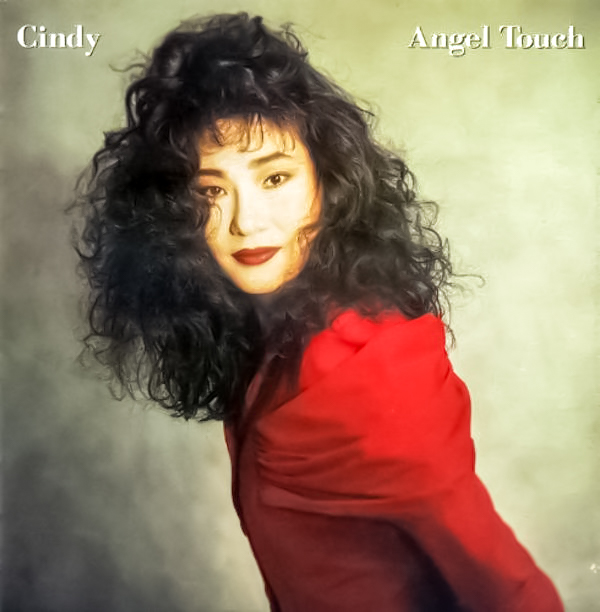
Just something for the lovers out there: Cindy’s exceptional J-Soul heavy, Angel Touch. Perfectly distilling that gorgeous in between period of the early ‘90s r&b scene, it can’t help but be a tad dated but also more than a tad timeless and (surprisingly) au courant. For those who need a bit of comfort and joy, mixed with more than an inkling of nostalgia let’s see if we can revisit the late, great Mayumi Yamamoto’s aka “Cindy” exceptional and exceptionally short career.
If you’re Japanese and heck, judging by the upcoming reissue of Mayumi’s Stevie Wonder-assisted debut, Love Life, you probably don’t need me to explain how important Mayumi was in the grand scheme of J-Soul music. Making her name first not as a solo singer but as a backup singer and songwriter, Mayumi’s name has graced the credits of tons of albums from Japanese music luminaries like Tatsuro Yamashita, Yumi Matsutoya, Hiroshi Satoh, and Yuji Toriyama. However, as stated everywhere (or elsewhere), her true claim to fame came from writing music, specifically the iconic “Mermaid”, for Japanese idol, actress, model, and singer, Miho Nakayama.
Not for lack of trying did Kanagawa’s own Mayumi try to put her name out there as a solo singer. 1981’s theme to the Urusei Yatsura anime bears witness to that. It wouldn’t be until three years later in 1984 when “Chance On Love” tried to cash in on its surging popularity to push for Mayumi to do her thing. Signed by Kitty Records and with the offer one just couldn’t refuse — have Little Stevie contribute words and music on her debut — Mayumi kept her alias and demanded something little heard of for a female singer then: control over the production.
It’s not hard to see why Love Life remains its own lasting, powerful thing. Sung completely in English, it’s an easy entry way to those young upstarts raising themselves on City Pop and J-Funk. Although released in the mid ‘80s, its waypoints still point back to the lean, warmer soul of Syreeta (obviously) and Minnie Ripperton. So, you can see, if it split the difference between MOR, newfound electrosoul, and westcoast AOR, all great ingredients, it might not have been enough within its own time to save the whole stew. Now we can appreciate it as a lost classic but then it was a positive flop, regardless of Mr. Wonder’s help.
Fast forward four years later, fresh off a stint as a radio DJ, and signed to a label more suited to Mayumi’s more personable style, 1990’s Angel Touch showed my favorite change in her career. This time around, vibing on the sophisticated sounds of nocturnal jazz, late-period New Jack Swing, and all sorts of micro-soul genres Yuji Toriyama and Hiroshi Narumi (the half of equally vital Narumin & Etsu) were experimenting with, Angel Touch sounded and leaned quite “adult”.
Leading off with the stunning ballad “Surprise”, we get to hear Mayumi sing in Japanese. In her native language the words seem to come off more powerful, inviting, and relaxed. It’s no wonder that all Hiroshi and Yuji have to do is lay back and let Mayumi take the reins, embracing the sashay of her awfully tender music. Joined by the understated backup vocals of the equally brilliant Kumi Sasaki, it well deserved introducing anyone to Mayumi’s style.
Upbeat numbers like “せつなくて” and “Destiny”, both found on the front end of the CD, positively glow with that same unescapable synth bounce that others like Mariah Carey would explore the same year. Six minute long dance floor burners never outstay their invitation when they’re arranged like the latter song. Then you get absolutely leftfield experiments like “When Tomorrow Comes” that predict alt-r&b still a ways away, but now let you get a peek of the wonderfully creative soul music Mayumi was itching to create right here and now.
Jumping around forward to “私達を信じていて” we get to hear Paradigm Shift’s Masato Matsuda and Prism’s Jun Aoyama join Hiroshi and Mayumi for a simply stunningly joyful, soulful vamp that sounds like some lost should-a-been summertime hit. Then that is followed by the S.O.S. Band on Yokohama tires rump shaker “Candle Lights” where Yuji pretends to find his inner Alexander O’Neal while Mayumi slowly, aggressively makes the whole track steadily “freer” and looser.
That ability to feel at ease in herself perfectly builds through the album’s final three cuts. On the first one, Tats Yamashita, quietly contributes some of his most understated accompaniment, allowing Mr. Narumi and Mayumi to “rock the boat”, sonically, letting this song earn its five minute length, letting Mayumi dress all sorts of love for us, the listener. “When Tomorrow Comes” again in a reprise as Mayumi serenades us away to the album’s finale. Much like EPO, Mayumi wasn’t going to let this new decade leave her in the last.
Wrapping us in peak ‘90s nostalgia, “Must Be Lucky ~愛の国へ~”, Chinfa Kan’s deadly, straight to the point lyrics, those that have been hovering throughout the album, reach their peak, leveraging their hookability through Mayumi’s most danceable, joyful, and complex track yet. Can you ignore the pristine bass lines? Can you ignore those music video-ready, running through the streets, and dance-inducing conjurable synth grooves? I gotta say we’re the lucky ones to be able to hear Mayumi sing her heart out to us. 30 years later, it still has that angel’s touch.
